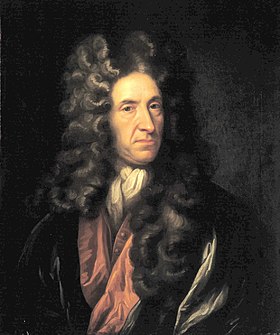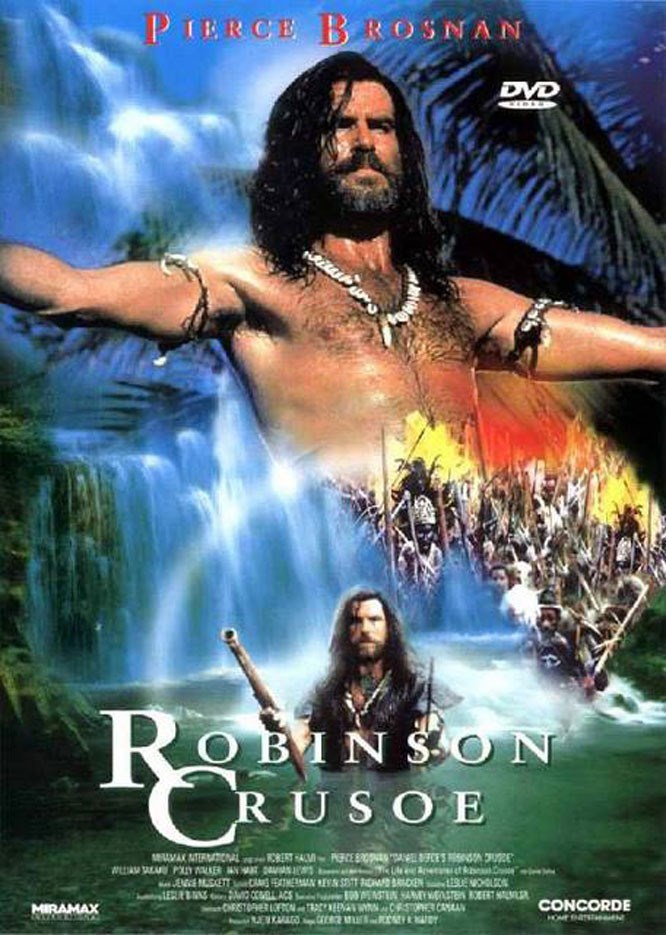Daniel Defoe


Robinson Crusoe
Introduction about authors :
Daniel Defoe (c. 1660 – 24 April 1731), born Daniel Foe, was an English trader, writer, journalist, pamphleteer, and spy. He is most famous for his novel Robinson Crusoe, which is second only to the Bible in its number of translations. Defoe is noted for being one of the earliest proponents of the novel, as he helped to popularise the form in Britain with others such as Aphra Behn and Samuel Richardson, and is among the founders of the English novel.
Colonial discourse in Robinson Crusoe :
Daniel Defoe’s Robinson Crusoe, a classic in English literature, and regarded by many as the first English novel, has been interpreted in different ways. First it is a religious and moral allegory as stressed by Defoe himself in the Preface. Also, Rousseau was inspired by it to “Return to Nature”.
Robinson Crusoe colonialism quotes.
The first part of the story of Robinson
Crusoe begins with Crusoe’s being stranded and marooned in an inhabited
island, far from the rest of the world. This happens for their ship’s being
wrecked in a storm, and only he being left. In such a condition, he begins his struggle for existence and consequently
succeeds.
In a sense, Crusoe attempts to replicate his own society or colony on
the island. This has been achieved through application of some qualities of
Crusoe, and some instruments, and proper handling of different situations.
First,
the qualities by dint of which Crusoe has been able to change the island
inhabitable to habitable, are his courage, hard struggle with situation,
determination, devotion, creativity.
Then, in order to make his colony
inhabitable and cultivable, he applies
European technology and agriculture. He brings, from the stranded ship, a
large number of articles and corps which are useful to him in his desolate
condition on the island. These things include several items of food, several
weapons e.g. guns and pistols, considerable ammunition including gunpowder,
such tools as saws, and axe, a hammer, several bottles of rum, a box of sugar,
a hammock, some clothing, some bedding, some money, though useless at that
situation, a bag full of chicken feed, a bag full of nails, some corps and a
number of other things. Using these things, day after day for a long time
Crusoe establishes a society of his
own in which there come some other men by accident.
Crusoe establishes “a rudimentary political hierarchy” in the land. Crusoe,
several times in the novel, refers to himself as the ‘king’ of the island. In his own word –
“a secret kind of Pleasure... to think
that this was all my own, that I was king and lord of all this country
indefeasibly, and had a right of Possession.”
Whilst
the captain describes him as the “Governour”
to the mutineers.
“The idealised master-servant relationship
Defoe depicts between Crusoe and Friday can also be seen in terms of cultural
imperialism. Crusoe represents the ‘enlightened’
European whilst Friday is the ‘savage’
who can only be redeemed from his supposedly barbarous way of life through the
assimilation of Crusoe’s culture.”
Crusoe
saves, for his own purpose, a prisoner who was running away from the clutches
of some cannibals. When he sees it, he thinks,
“It came now very warmly upon my
thoughts, and indeed irresistibly, that now was my time to get me a servant,
and perhaps a Companion, or Assistant.”
Crusoe
names the prisoner Friday, introduces himself to him as ‘Master’, and teaches him language actually for his own benefit like
the colonists. He says –
“I was greatly delighted with him, and made
it my Business to teach him every thing, that was proper to make him useful,
handy, and helpful; but especially to make him speak, and understand me what I
speak.”
The colonialists come to colonies with
some mission with them. Similarly Crusoe’s
mission is to preach. To make it easy and to communicate with Friday he
taught him language. When Crusoe knows from him about their false God,
Beramucke, he begins preaching –
“I began to instruct him in the
knowledge of the true God”
The English sea-captain, having prayed
Crusoe to recover his ship from the hands of the mutineers, Crusoe raises two
conditions which indicate his colonial
attitude of making contact. His conditions are:
“That while you stay on this island with
me, you will not pretend to any authority here;”
and
“That if the ship is, or may be recovered,
you will carry me and my Man to English passage free.”
Though Crusoe leaves his island for
England, he leaves an unseen control
over the land. Instead of his being settled in England, he longs for going
to adventure again. He makes a voyage to East Indies and to the island which he
explicitly calls his “Colony”. He
says –
“In this voyage I visited my new Colony in
the Island, saw my successors the Spaniards, had the whole story of their
lives, and of the Villains I left there.”
We see here, Crusoe is very kind of
Friday but there is of course difference
between ‘we’ and ‘they’, between my ‘Man’
and my ‘Master’. Actually the relation between the colonizer and the
colonized is here soft become both of them are at stake and in initial
stage where there is no revolt between them. But we can look into The
Tempest where Shakespeare shows the aftermath of teaching language, while
there is no aftermath or consequence of colonization in Robinson Crusoe.
Caliban complains to his master,
“You taught me language; and my profit
on..
Is, I know how to curse: the red
plague rid you
For learning me your language!”
“Nevertheless,
within the novel, Defoe also takes the opportunity to criticise the historic Spanish conquest of South America.”
Crusoe thinks that if he attacks the cannibals who have come to the shore of
his island, it would not be just for him. Rather,
“this would justify the conduct of the Spaniards
in all their Barbarities practised in America, and where they destroyed
Million’s of these people, who... were yet... very innocent people.”
On the issues of gender, race and colonialism, J.M. Coetzee presents Foe
which re-images Robinson Crusoe which lacked female character. Here Coetzee
adds a woman, Susan Barton, cast away on the same island as Robinson Crusoe
(here called Cruso) and Friday. “After their rescue by a passing merchantman,
Crusoe dies aboard the ship and Susan and Friday are left to make their way in
England.”
In this novel, Friday is an ugly Negro
and mutilated: none knows who has mutilated him. Actually “the pertinence of
Friday to black history is not in question: the inaccessibility of his world to
the European world is a consequence of colonialist oppression and racism. The mutilation in his mouth is emblematic
of Black-African cultural castration operated by the white invaders.”
In fine, we agree with James Joyce that
“the true symbol of the British conquest is Robinson Crusoe”:
“He is the true prototype of the British
colonists... The whole Anglo-Saxon spirit is in Crusoe: the manly independence
# the sexual apathy, the calculating taciturnity.”
Defoe
has shown the idealized colonialism of
initial stage, but not the after fall stage, as in the Tempest, nor
the barbarous result of colonialism, as expressed in Foe.
Consider Robinson
Crusoe as a colonial narrative.
Colonialism is defined as the establishment, maintenance, acquisition and
expansion of colonies in one territory by people from another
territory. England was for a long while, by far the most powerful and
widely spread colonial empire in the world. For instance, there were the
American colonies, as well as a British presence in China and India. In fact,
it is only in the last ten years that Hong Kong reverted from the English back
to China.
Colonization occurred primarily in the late 15th to the 20th century. The
justifications for colonialism included Christian missionary work,
the profits to be made, the expansion of the power of the metropolis
and various religious and political beliefs.
Portugal was, at one time, a dominant colonial force in Europe, as was
Spain. Their position as colonial powers faltered in the seventeenth century,
while England and France surged ahead to become the prevailing world
powers.
In Defoe's Robinson Crusoe, colonialism is clearly apparent. To put
the literary work into its proper context, it should be noted that the story
was published in 1719, and England was enjoying the prosperity of the American
colonies. England had adopted the stance that "God is on the side of the
English" during Queen Elizabeth I's reign (after defeating the Spanish
Armada—the strongest naval fleet in the world); this attitude had not
diminished. Surely it only increased as the nation's holdings increased, which
also included "islands in the West Indies."
Based
upon the time in which it was written, Crusoe would have found the benefits of
his country's "international policy" in keeping with his own
capitalist endeavors. Colonialism is seen in the story after Crusoe leaves the
island—for while he is there, he realizes that the things he valued in England,
Brazil and on his travels revolved around money.
Conclusion :
Finally, we see a clear representation of colonization with
regard to Crusoe's island. He has discovered and claimed it—in the same
spirit as England's explorers and military leaders had claimed England's
own colonies. When he is rescued, the ship's captain tells the
mutineers that Crusoe is employed by "the governor."Crusoe "owns" the island and instructs those living there just as if he were the "governor" or political leader—just as any British colony would be governed.

No comments:
Post a Comment